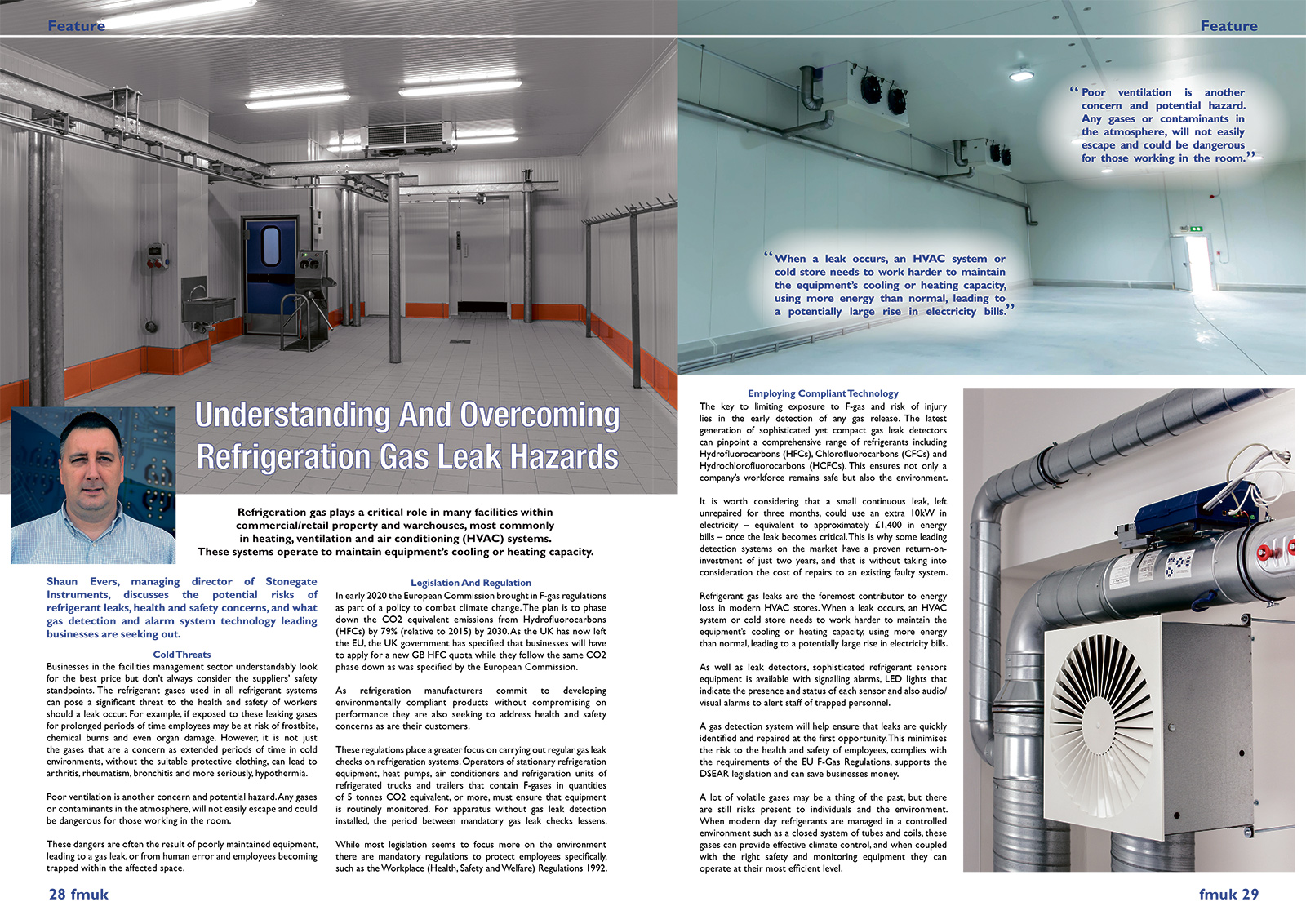Understanding And Overcoming Refrigeration Gas Leak Hazards
 Refrigeration gas plays a critical role in many facilities within commercial/retail property and warehouses, most commonly in heating, ventilation and air conditioning (HVAC) systems. These systems operate to maintain equipment’s cooling or heating capacity. SHAUN EVERS, managing director of Stonegate Instruments, discusses the potential risks of refrigerant leaks, health and safety concerns, and what gas detection and alarm system technology leading businesses are seeking out.
Refrigeration gas plays a critical role in many facilities within commercial/retail property and warehouses, most commonly in heating, ventilation and air conditioning (HVAC) systems. These systems operate to maintain equipment’s cooling or heating capacity. SHAUN EVERS, managing director of Stonegate Instruments, discusses the potential risks of refrigerant leaks, health and safety concerns, and what gas detection and alarm system technology leading businesses are seeking out.
Cold Threats
Businesses in the facilities management sector understandably look for the best price but don’t always consider the suppliers’ safety standpoints. The refrigerant gases used in all refrigerant systems can pose a significant threat to the health and safety of workers should a leak occur. For example, if exposed to these leaking gases for prolonged periods of time employees may be at risk of frostbite, chemical burns and even organ damage. However, it is not just the gases that are a concern as extended periods of time in cold environments, without the suitable protective clothing, can lead to arthritis, rheumatism, bronchitis and more seriously, hypothermia.
Poor ventilation is another concern and potential hazard. Any gases or contaminants in the atmosphere, will not easily escape and could be dangerous for those working in the room.
These dangers are often the result of poorly maintained equipment, leading to a gas leak, or from human error and employees becoming trapped within the affected space.
Legislation And Regulation
In early 2020 the European Commission brought in F‑gas regulations as part of a policy to combat climate change. The plan is to phase down the CO2 equivalent emissions from Hydrofluorocarbons (HFCs) by 79% (relative to 2015) by 2030. As the UK has now left the EU, the UK government has specified that businesses will have to apply for a new GB HFC quota while they follow the same CO2 phase down as was specified by the European Commission.
As refrigeration manufacturers commit to developing environmentally compliant products without compromising on performance they are also seeking to address health and safety concerns as are their customers.
These regulations place a greater focus on carrying out regular gas leak checks on refrigeration systems. Operators of stationary refrigeration equipment, heat pumps, air conditioners and refrigeration units of refrigerated trucks and trailers that contain F‑gases in quantities of 5 tonnes CO2 equivalent, or more, must ensure that equipment is routinely monitored. For apparatus without gas leak detection installed, the period between mandatory gas leak checks lessens.
While most legislation seems to focus more on the environment there are mandatory regulations to protect employees specifically, such as the Workplace (Health, Safety and Welfare) Regulations 1992.
Employing Compliant Technology
The key to limiting exposure to F‑gas and risk of injury lies in the early detection of any gas release. The latest generation of sophisticated yet compact gas leak detectors can pinpoint a comprehensive range of refrigerants including Hydrofluorocarbons (HFCs), Chlorofluorocarbons (CFCs) and Hydrochlorofluorocarbons (HCFCs). This ensures not only a company’s workforce remains safe but also the environment.
It is worth considering that a small continuous leak, left unrepaired for three months, could use an extra 10kW in electricity – equivalent to approximately £1,400 in energy bills – once the leak becomes critical. This is why some leading detection systems on the market have a proven return‑on‑investment of just two years, and that is without taking into consideration the cost of repairs to an existing faulty system.
Refrigerant gas leaks are the foremost contributor to energy loss in modern HVAC stores. When a leak occurs, an HVAC system or cold store needs to work harder to maintain the equipment’s cooling or heating capacity, using more energy than normal, leading to a potentially large rise in electricity bills.
As well as leak detectors, sophisticated refrigerant sensors equipment is available with signalling alarms, LED lights that indicate the presence and status of each sensor and also audio/visual alarms to alert staff of trapped personnel.
A gas detection system will help ensure that leaks are quickly identified and repaired at the first opportunity. This minimises the risk to the health and safety of employees, complies with the requirements of the EU F‑Gas Regulations, supports the DSEAR legislation and can save businesses money.
A lot of volatile gases may be a thing of the past, but there are still risks present to individuals and the environment. When modern day refrigerants are managed in a controlled environment such as a closed system of tubes and coils, these gases can provide effective climate control, and when coupled with the right safety and monitoring equipment they can operate at their most efficient level.
Click the article to enlarge it.


























































